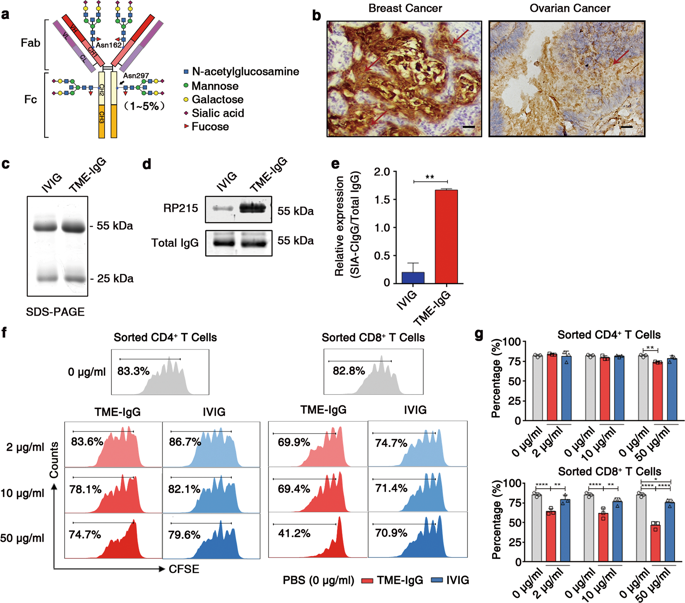Cellular & Molecular Immunology ( IF 21.8 ) Pub Date : 2019-11-21 , DOI: 10.1038/s41423-019-0327-9 Zihan Wang 1, 2, 3 , Zihan Geng 1, 2, 3 , Wenwei Shao 1, 2 , Enyang Liu 1, 2 , Jingxuan Zhang 1, 2 , Jingshu Tang 1, 2 , Pingzhang Wang 1, 3 , Xiuyuan Sun 1, 2 , Lin Xiao 4 , Weiyan Xu 1, 2 , Youhui Zhang 5 , Heng Cui 6 , Liang Zhang 7 , Xi Yang 7 , Xiaohong Chang 6 , Xiaoyan Qiu 1, 2, 3

|
To date, IgG in the tumor microenvironment (TME) has been considered a product of B cells and serves as an antitumor antibody. However, in this study, using a monoclonal antibody against cancer-derived IgG (Cancer-IgG), we found that cancer cells could secrete IgG into the TME. Furthermore, Cancer-IgG, which carries an abnormal sialic acid modification in the CH1 domain, directly inhibited effector T-cell proliferation and significantly promoted tumor growth by reducing CD4+ and CD8+ T-cell infiltration into tumor tissues. Mechanistic studies showed that the immunosuppressive effect of sialylated Cancer-IgG is dependent on its sialylation and binding to sialic acid-binding immunoglobulin-type lectins (Siglecs) on effector CD4+ and CD8+ T cells. Importantly, we show that several Siglecs are overexpressed on effector T cells from cancer patients, but not those from healthy donors. These findings suggest that sialylated Cancer-IgG may be a ligand for Siglecs, which may serve as potential checkpoint proteins and mediate tumor immune evasion.
中文翻译:

癌症衍生的唾液酸化 IgG 通过与效应 T 细胞上的 Siglecs 结合促进肿瘤免疫逃逸
迄今为止,肿瘤微环境 (TME) 中的 IgG 已被认为是 B 细胞的产物并用作抗肿瘤抗体。然而,在这项研究中,我们使用针对癌症衍生 IgG (Cancer-IgG) 的单克隆抗体,发现癌细胞可以将 IgG 分泌到 TME 中。此外,在 CH1 结构域中携带异常唾液酸修饰的 Cancer-IgG 通过减少 CD4 +和 CD8 + T 细胞浸润到肿瘤组织中直接抑制效应 T 细胞增殖并显着促进肿瘤生长。机理研究表明,唾液酸化 Cancer-IgG 的免疫抑制作用取决于其唾液酸化和与唾液酸结合免疫球蛋白型凝集素 (Siglecs) 对效应 CD4 +和 CD8 +的结合T细胞。重要的是,我们发现几个 Siglecs 在癌症患者的效应 T 细胞上过度表达,但不是来自健康供体的效应 T 细胞。这些发现表明唾液酸化的 Cancer-IgG 可能是 Siglecs 的配体,可作为潜在的检查点蛋白并介导肿瘤免疫逃避。











































 京公网安备 11010802027423号
京公网安备 11010802027423号